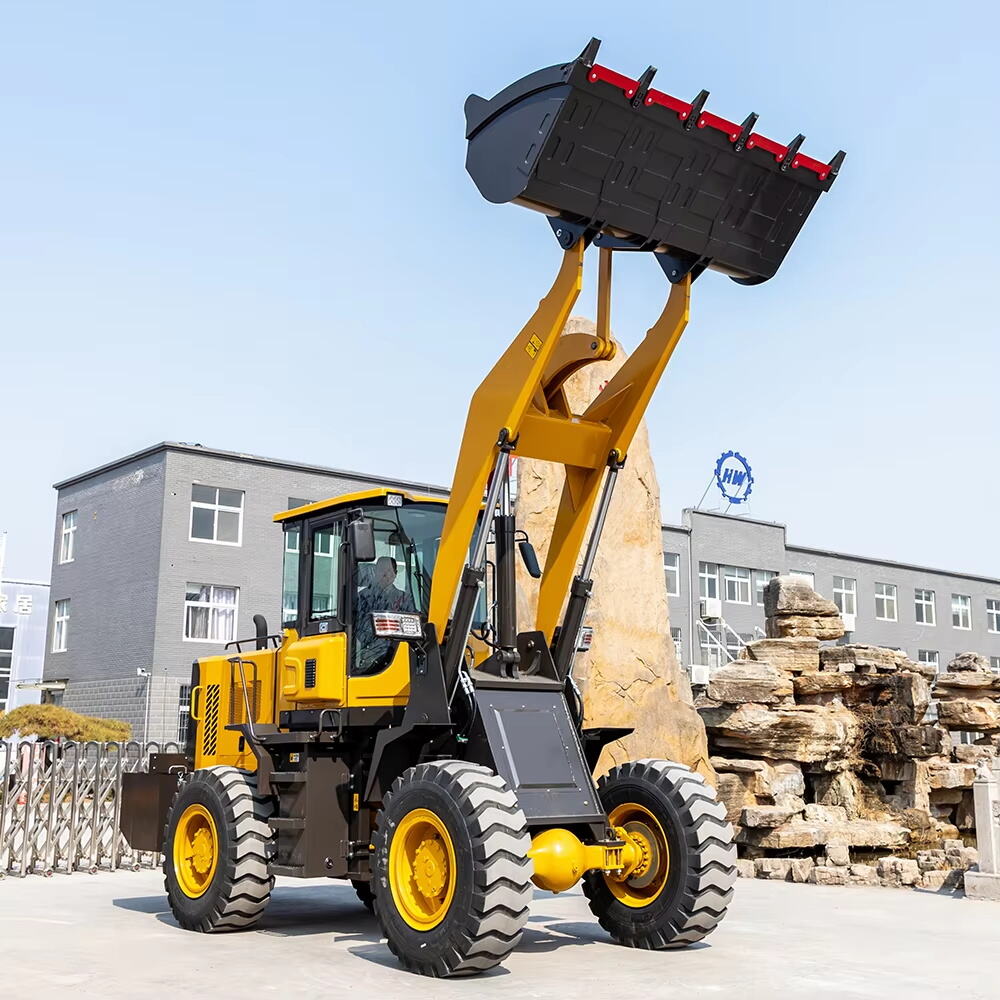Bygg- och materialhanteringsbranschen har genomgått en anmärkningsvärd utveckling vad gäller utrustningsteknologi, med hjul Lastbilar hjullastare som blivit oumbärliga maskiner som revolutionerar arbetsplatsens effektivitet. Dessa kraftfulla maskiner utgör grunden för många bygg-, gruv- och industriella operationer, och erbjuder mångsidighet och tillförlitlighet som betydligt förbättrar projekterna. Moderna hjullastare kombinerar robust teknik med avancerade funktioner för att leverera exceptionell prestanda över olika applikationer.
Från att flytta tunga material till precisionsladdningsuppgifter har hjullastare blivit oumbärliga tillgångar som förändrar hur arbetet utförs på arbetsplatser. Deras förmåga att hantera flera uppgifter samtidigt som de upprätthåller hög produktivitet gör dem till en avgörande investering för byggföretag och entreprenörer som strävar efter att optimera sina operationer.
Hjullastare är utmärkta i olika materialhanteringscenarier och visar en anmärkningsvärd effektivitet i att flytta bulkmaterial såsom ballast, jord och rivningsavfall. Deras robusta design tillåter snabba laddningscykler, vilket gör det möjligt för operatörer att överföra stora mängder material på kortare tid. Maskinerna är utrustade med kraftfulla hydraulsystem som tillhandahåller den nödvändiga kraften för att lyfta och bära tunga laster samtidigt som stabilitet upprätthålls.
Dessa mångsidiga maskiner kan utrustas med olika bucketstorlekar och tillbehör, vilket gör att de kan hantera material med olika densiteter och egenskaper. Oavsett om det gäller att lasta lastbilar, lagerhålla material eller rensa byggarbetsplatser, säkerställer hjullastare en konsekvent prestanda som håller projekten i gång.
Utöver materialhantering visar hjullastare sig vara oumbärliga vid markflyttning. Deras förmåga att snabbt och effektivt flytta jord, grus och annat material gör dem avgörande för arbetsplatsberedning och planläggning. Den vridbara styrsystemet säkerställer utmärkt manövrerbarhet, vilket gör att förarna kan arbeta effektivt i trånga utrymmen samtidigt som de behåller exakt kontroll.
Maskinernas förmåga att arbeta i marken sträcker sig till att rensa och jämna ut ytor, skapa korrekta lutningar och förbereda grunder för byggnadsprojekt. Denna mångsidighet eliminerar behovet av flera specialiserade maskiner, vilket minskar utrustningskostnader och förenklar logistiken på arbetsområdet.

Moderna hjullastare är utrustade med sofistikerade styrsystem som optimerar prestanda och bränsleeffektivitet. Dessa intelligenta system övervakar maskinens arbete i realtid och justerar effektuttag och hydraultryck för att matcha specifika arbetsuppgifters krav. Avancerade sensorer och inbyggda datorer samarbetar för att förbättra förarens kontroll samtidigt som onödig bränsleförbrukning minskas.
Integreringen av automatiserade funktioner, såsom återgång-till-grävning och kontroll av lyftuddens höjd, förenklar upprepade arbetsuppgifter och minskar förarens trötthet. Dessa teknologiska innovationer förbättrar inte bara produktiviteten utan bidrar också till mer hållbara operationer genom att optimera resursutnyttjandet.
Införandet av telematiksystem i hjullastare har revolutionerat hanteringen av fordonspark och underhållsplanering. Dessa system tillhandahåller realtidsdata om maskinprestanda, bränsleförbrukning och underhållsbehov, vilket möjliggör proaktiv utrustningsstyrning. Platschefer kan övervaka flera maskiner samtidigt och identifiera potentiella problem innan de leder till kostsam driftstopp.
Avancerade diagnostikfunktioner gör det möjligt för underhållsteam att planera serviceintervall mer effektivt, vilket säkerställer optimal maskinprestanda samtidigt som oförutspådda reparationer minimeras. Den här prediktiva metoden för utrustningsunderhåll minskar driftkostnaderna avsevärt och förlänger maskinernas livslängd.
Moderna hjullastare prioriterar förartrivsel genom ergonomiskt utformade förarkabiner som minskar trötthet under långa arbetsdagar. Klimatkontrollerade miljöer, justerbara säten och förbättrad synlighet bidrar till bättre förarprestanda och jobbutförlighet. Den strategiska placeringen av kontroller och visarpanelar säkerställer intuitiv drift samtidigt som fysisk belastning minimeras.
Ljudisolerings- och vibrationsdämpningssystem skapar en tystare och mer komfortabel arbetsmiljö, vilket tillåter förare att hålla koncentrationen och produktiviteten uppe under hela arbetspassen. Dessa komfortfunktioner påverkar driftseffektiviteten direkt genom att minska förarens trötthet och förbättra den allmänna jobbutförligheten.
Säkerhet förblir en högsta prioritet i konstruktionen av hjullastare, där tillverkare implementerar omfattande säkerhetsfunktioner. Backkameror, närvarosensorer och objektdetekteringssystem ger förare förbättrad medvetenhet om omgivningen. Nödstoppssystem och stabiliseringskontroller säkerställer säker drift även under svåra förhållanden.
Utbildningsprogram och förarassistersystem hjälper till att maximera nytta av dessa säkerhetsfunktioner samtidigt som de främjar bästa praxis vid maskindrift. Detta engagemang för säkerhet skyddar inte bara arbetstagare utan bidrar också till smidigare och mer effektiva operationer på arbetsplatser.
Att investera i en modern hjullastare medför betydande kostnadsbesparingar genom förbättrad bränsleeffektivitet, minskade underhållskrav och ökad produktivitet. Maskinernas mångsidlighet eliminerar behovet av flera specialiserade utrustningsenheter, vilket leder till lägre totala flådkostnader. Avancerad motorteknologi och effektiva energihanteringssystem optimerar bränsleförbrukningen samtidigt som hög prestanda upprätthålls.
Minskade krav på manuellt arbete och snabbare uppgiftsfärdigställande bidrar till betydande besparingar i arbetskostnader. Dessa ekonomiska fördelar gör hjullastare till en attraktiv investering för byggföretag som vill optimera sina operationer och förbättra marginalerna.
Hjullastare representerar en strategisk investering som fortsätter att skapa värde genom hela sin livscykel. Deras hållbarhet och tillförlitlighet, tillsammans med ordentlig underhåll, resulterar i lång livslängd och stark återförsäljningsvärde. Maskinernas anpassningsbarhet till olika applikationer säkerställer konsekvent användning över olika projekt och arbetsförhållanden.
Integreringen av modern teknologi och effektiva designfunktioner placerar hjullastare som framtidsinvesteringar som kan anpassas till föränderliga branschkrav. Denna långsiktiga syn på värdeskapande gör dem till oumbärliga tillgångar för företag som fokuserar på hållbar tillväxt och operativ excellens.
Den ideala hjullastarens storlek beror på olika faktorer såsom typ av material som ska hanteras, arbetsvillkor och nödvändig lyftkapacitet. Beakta faktorer såsom typiska lastvikter, begränsningar i arbetsutrymmet och transportkrav när du väljer lämplig maskinstorlek.
Förbättra bränsleeffektiviteten genom att använda rätt körteknik, följa regelbundna underhållsintervall och använda inbyggda ekolägen. Utbilda förare i effektiva lastningsmönster, undvik onödigt tomgångskörning och se till att däcktrycket är korrekt för att minska bränsleförbrukningen.
Följ tillverkarens rekommenderade underhållsintervall för rutinmässiga serviceåtgärder, inklusive regelbundna oljebyten, filterbyten och systemkontroller. Utför dagliga inspektioner av kritiska komponenter och använd telematikdata för att följa maskinens status och schemalägga förebyggande underhåll effektivt.
 Senaste Nytt
Senaste Nytt2024-10-31
2024-10-28
2024-10-25
2024-10-23
2024-10-21
2024-09-03